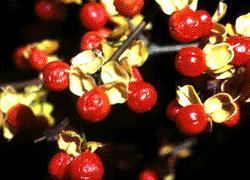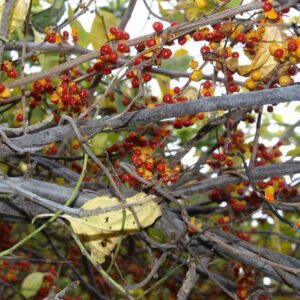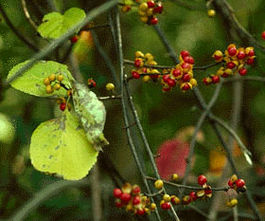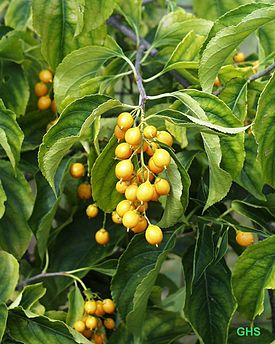

American Bittersweet Seed
American bittersweet is a native woody and shrubby climber, growing over trees or fences. It has smooth thin leaves 2 to 4 inches long and about half as wide. The small greenish-white flowers are produced in June in short clusters. The fruit is a round, orange-yellow capsule which opens in autumn, disclosing the scarlet-colored seed pod. The seed capsules remain on the plant well into the cold season and provide food for birds in the winter. Fruits are eaten by songbirds, ruffed grouse, pheasants, bobwhite and squirrel. Old fruits are eaten as survival foods by many birds and animals in late winter. Fruits should NOT be eaten by humans. While not extremely toxic, they will “clean you out at both ends”. Bunches of twisted branchlets, loaded with fruit, are very decorative and the plant is disappearing in many places because of the ruthless methods of market pickers. Our stock is not from the wild!! We have selected ‘stock’ plants which grow on site here and have chosen the best over the years for the most desirable characteristics.
Way back in the dark and mysterious past, many shepherds hung bittersweet around the necks of those sheep which were suspected to be under the evil eye. I don’t think it is really necessary myself. Save this bit of lore for your next trivia game.
Often planted as an ornamental vine for the showy fruits. A good climber on trellises, arbors, porches. Fast growing. Decorative berries and twisted vines make interesting projects.
You will need both male and female plants to produce berries! 1 male can pollinate 4-5 female vines. MUST be planted within 30 feet of each other.
Light: Partial to full sun. Best fruit in full sun.
Soil Moisture: Dry to moist.
Soil pH: Acid to neutral.
Hardy to zone 4a and some say zone 3.


Angulatus Bittersweet Seed
Celastrus angulatus is a deciduous Climber growing to 7.3 m (24ft) by 10 m (32ft) at a fast rate.
It is hardy to zone (UK) 5. It is in flower from Jul to August, and the seeds ripen from Nov to February. The flowers are dioecious (individual flowers are either male or female, but only one sex is to be found on any one plant so both male and female plants must be grown if seed is required) and are pollinated by Bees.Suitable for: light (sandy), medium (loamy) and heavy (clay) soils. Suitable pH: acid, neutral and basic (alkaline) soils. It can grow in full shade (deep woodland) semi-shade (light woodland) or no shade. It prefers moist soil.
Often planted as an ornamental vine for the showy fruits. A good climber on trellises, arbors, porches. Fast growing. Decorative berries and twisted vines make interesting projects.
You will need both male and female plants to produce berries! 1 male can pollinate 4-5 female vines. MUST be planted within 30 feet of each other.
Light: Partial to full sun. Best fruit in full sun.
Soil Moisture: Dry to moist.
Soil pH: Acid to neutral.
Hardy to zone 4a and some say zone 3.
